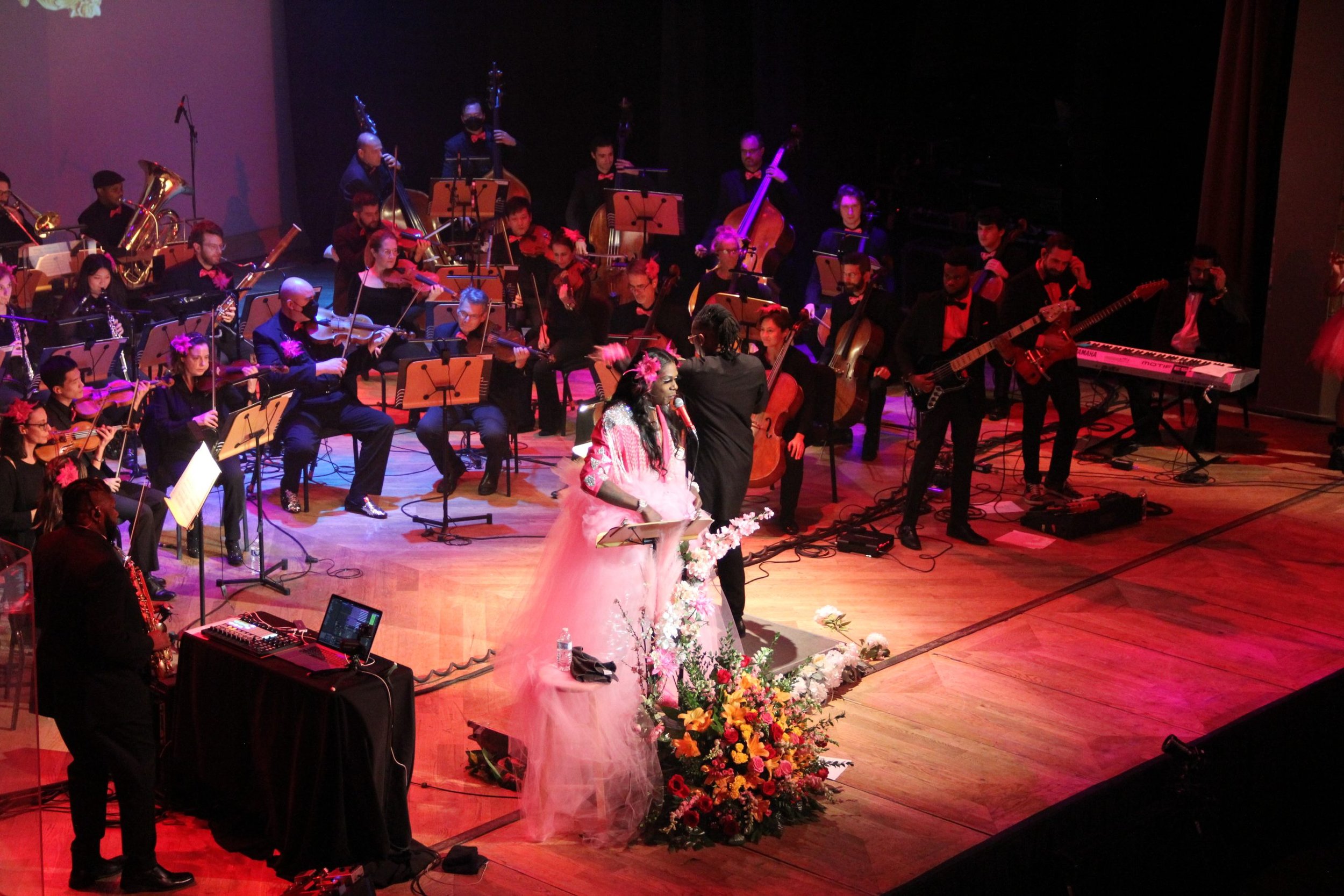French Quarter Fest: Partners-N-Crime Have More Accomplices

The first-generation bounce artists have found renewed energy with the Big Easy Bounce Band.
In 2010, Trombone Shorty curated “Red Hot + NOLA,” an all-star New Orleans concert at the Brooklyn Academy of Music that not only featured Irma Thomas, Dr. John, and the usual suspects, but also rappers including Juvenile and Mannie Fresh. In Jon Pareles’ review in The New York Times, he wrote
New Orleans music also maintains its jazz-funeral determination to celebrate rather than mourn. Partners-N-Crime (PNC), a rap duo that had local bounce hits in the 1990s, enlisted Trombone Shorty and Rebirth members for a second-line parade sound in “Foot Work”; it included the lines “Katrina’s gone, can’t cry no more/ All the money’s gone, but the levees ain’t broke no more.”
The experience was a game changer for Partners-N-Crime. The hip-hop duo had been around since the mid-‘90s, but rap audiences move on with breathtaking speed, so the group no longer had the currency it once enjoyed. Still, New Orleanians Shorty’s age remember when “Pump Tha Party” and “New Orleans Block Party” were the jams and still have a lot of affection for PNC.
One such person is Eric Heigle, the drummer with The Big Easy Bounce Band. PNC and bounce was the soundtrack for hanging out in high school for him. “PNC 3—I ate that one up,” Heigle says.
“To be honest with you, it defined Partners-N-Crime,” says Walter Williams, also known as PNC's Kango Slim.
Heigle and the Big Easy Bounce Band will play with Partners-N-Crime and DJ Jubilee on the French Quarter Fest’s Tropical Isle Hand Grenade Stage Thursday at 3:50 p.m., and the connection between PNC and the band is a direct result of the Red Hot + NOLA experience.
“When we came back, we had it in mind that [playing with a group] was something we really, really wanted to do,” Williams says. He and Mr. Meana (Michael Patterson) recognized the difference in the impact they had when they were backed by Rebirth and Shorty in Brooklyn and saw that as the direction forward. Williams was aware that the show was more entertaining when there other musicians onstage with them, and it helped introduce another element into the PNC sound.
“We started to incorporate this funk sound into what we do in addition to ‘Pump Tha Party’ and ‘New Orleans Block Party’ and the Partners-N-Crime sound,” he says. “It is a little different, but it’s something we’ve loved for a long time and wanted to do. We were thinking, This is something we need to get into now.”
The past “wasn’t the time” to be funky he says, which sounds like a delicate way of talking around how things had changed for PNC. In their heyday, being funky in an unconventional, DJ-centric way reinforced the band’s underground status. An awkward part of the New Orleans music story in the ‘90s and 2000s is how many rappers outsold the artists hailed as musical royalty, and part of the rappers’ cred came from being the new voices for those who felt excluded from the mainstream.
Besides, PNC didn’t need to do anything different when they were hotter. But bounce’s shelf life had largely passed before Hurricane Katrina, and after the storm a breathless, hyperactive clatter came to define the next wave of bounce.
“Sissy bounce” is clearly a touchy subject. Williams doesn’t say the phrase, mention any artists by name or disparage anything, but he does say, “What bounce really is is not what they portray.”
Still, the media attention it garnered, along with the general impulse after Katrina to preserve everything indigenously New Orleans prompted renewed local and national interest in bounce’s present and past including Partners-N-Crime. The lowered stakes freed up PNC to experiment with a live band, and they first partnered with indie rock band Big Rock Candy Mountain. In 2010, the band accompanied PNC when it played at South by Southwest in Austin, Texas, but Big Rock Candy Mountain is a rock band, and when a mutual acquaintance connected Williams and Heigle, their musical interests were a better fit.
“I really took to bounce in a big way, particularly Partners-N-Crime because of the musical element,” Heigle says. “It’s heavy on the drums, the rhythm.”
Williams was 17 when PNC 3 came out in 1995, and he, Meana, and early member Prime Time had been honing their act for two years before that playing gong shows promoted by singer Bobby Marchan. The shows were riffs on the Chuck Barris-hosted comedy/talent show that aired from 1976 to 1980. On the show, a panel of judges could gong an act and stop it mercifully early if it was too bad to continue, and Marchan’s gong shows took a similar approach minus the deliberately bad acts that dominated the television show. PNC did gong shows, as did Cheeky Blakk and Ms Tee, who had an act together, and Warren Mayes.
Williams was 15 and would sneak out of his house to go to play gong shows around town, and the next day he’d have to explain to his mom how he came up with $150—his share of the winnings. Williams remembers Marchan as being quiet, watching how the crowd responded to Partners-N-Crime and eventually, he managed them. “He told us the way to go was to get out of here, to travel,” Williams says.
Williams credits Rob Shaw, who worked with Marchan, for really helping them spread PNC’s name and music around the Gulf South. “He put us in the back of a raggedy Mercedes Benz and we rode through every town, and if they had a record shop we stopped in it, gave them a one-sheet, posters,” Williams says. “We stopped at a local club and told them to have PNC come and do a show. During that time, we were considered nobodies, but people figured, They drove down from the city; let’s give them a chance and put them on this weekend.”
At first, they were distributing PNC 3 themselves, so when the album sold 50,000 copies, they got a bigger chunk of the money than if they’d have cut a distributor into the picture—something they had to do when demand exceeded what they could meet by driving around the South.
“We were making money in those days,” Williams says. “I was 17 living in Park Royale on the bayou, and my mom couldn’t understand how I had my own apartment, my own car.”
Adapting PNC’s sound to a band format has taken some effort, according to Heigle. Once the Big Easy Bounce Band got the songs down, it started paying attention to some of the subtleties.
“When they’re doing their show with just a DJ, there’s a bottom octave that acoustic instruments don’t reach,” he says. “When you see a traditional band and a brass band, there’s something happening there that doesn’t happen with a DJ and mics. We’re trying to find the best of both worlds and breathe a new life into it, getting the dropped octaves with electronic drums and the tuba, but then he can say, Danny, rip a guitar solo, and we can go off the cuff and improvise.”
Williams is enjoying performing with a band so much that he’s trying to book more band gigs. “That’s where I see Partners-N-Crime going,” he says. The experience of playing with the band has re-energized him.
“When you get up in age, you have to have some sort of motivation,” Williams says. “That sound that we listened to when we heard Johnny ‘Guitar’ Watson and all these old songs that we danced around to at house parties with our families—we have the opportunity to do it with the band.”






